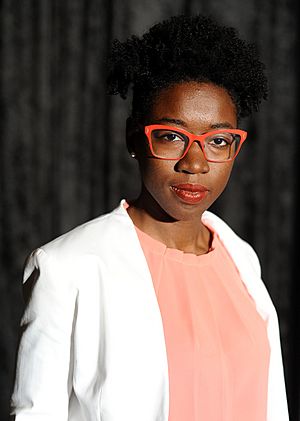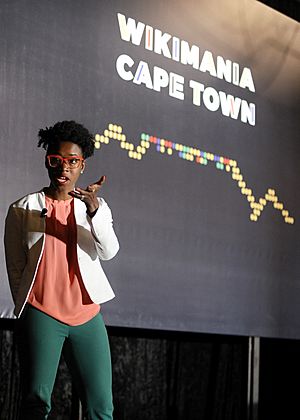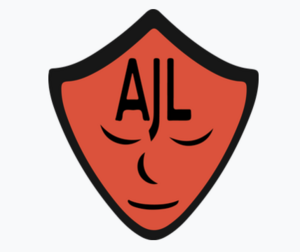Joy Buolamwini facts for kids
Joy Adowaa Buolamwini is a brilliant computer scientist and activist from Canada and the United States. She used to work at the famous MIT Media Lab. Joy started an organization called the Algorithmic Justice League (AJL). This group works to make sure that computer programs, especially those using artificial intelligence (AI), are fair to everyone. They use art, speaking up, and research to show how AI affects people's lives and to prevent any harm it might cause.
Quick facts for kids
Joy Buolamwini
|
|
|---|---|

Buolamwini at Wikimania 2018
|
|
| Born |
Joy Adowaa Buolamwini
23 January 1990 |
| Education | Cordova High School |
| Alma mater | Georgia Institute of Technology (BS) Jesus College, Oxford (MS) Massachusetts Institute of Technology (MS, PhD) |
| Known for | Algorithmic Justice League |
| Scientific career | |
| Fields | Media Arts & Sciences Computer science Algorithmic bias |
| Institutions | MIT Media Lab |
| Theses |
|
| Doctoral advisor | Ethan Zuckerman |
Contents
Joy's Early Life and School Days
Joy Buolamwini was born in Edmonton, Canada. She grew up in Mississippi and went to Cordova High School. When she was just nine years old, she was amazed by a robot named Kismet at MIT. This inspired her to teach herself computer languages like XHTML, JavaScript, and PHP.
Joy was also a talented athlete. She was a competitive pole vaulter and played basketball. She even did her advanced physics homework during basketball practice breaks!
College and Advanced Studies
Joy went to the Georgia Institute of Technology for college. There, she studied computer science and looked into how computers could help with health information. She graduated in 2012 and was a finalist for a special invention prize in 2009.
She earned many important scholarships, like the Rhodes Scholarship and the Fulbright Fellowship. These allowed her to study at top universities. She studied at the University of Oxford in England. Later, she earned two Master's degrees and a PhD from the MIT Media Lab. Her research focused on understanding and fixing problems with how AI "sees" people.
Joy's Work and Discoveries
Joy has used her skills to help people around the world. In 2011, she helped create a system for Ethiopia to check for an eye disease called trachoma using Android phones. In 2013, she worked in Zambia, teaching young people how to create technology.
Uncovering Bias in AI
As a researcher at the MIT Media Lab, Joy studied how to make sure computer programs are fair. She found that many facial recognition systems had trouble identifying dark-skinned women. This meant the technology wasn't working equally for everyone.
Her important project, called Gender Shades, showed these problems. Because of her research, big companies like IBM and Microsoft worked to make their AI systems better and more accurate. This shows how much impact Joy's work has had!
Joy also created the Aspire Mirror. This device uses facial recognition to show you a reflection of someone who inspires you.
Advocating for Fair AI
Joy founded the Algorithmic Justice League (AJL) to fight against unfairness in computer code. This group works to stop technology from treating certain groups of people unfairly. She has also made films like Code4Rights and Algorithmic Justice League: Unmasking Bias to share her message.
Her research has influenced major tech companies like Google and Microsoft to improve their products. In 2023, she advised President Biden on a special order about making AI safe and trustworthy.
In 2023, Joy wrote a book called Unmasking AI: My Mission to Protect What Is Human in a World of Machines. In her book, she explains how AI can have hidden biases. She warns that if we're not careful, AI could treat people unfairly or reinforce old stereotypes. Joy believes we need to create fair data for AI, check AI systems carefully, and make rules to ensure AI is used ethically.
Making AI Fair for Everyone
Joy Buolamwini's research is super important for making technology fair, especially for women and people of different skin tones. She found that AI facial recognition systems made many more mistakes when trying to identify darker-skinned women. Sometimes, the error rate was as high as 34.7% for them, but only 0.8% for lighter-skinned men. This showed that the AI was not fair because of how it was designed and trained.
Why AI Can Be Biased
Joy started her research because of her own experience. While working on an art project, she noticed that commercial AI systems couldn't always detect her face because of her darker skin. This led her to create the Gender Shades project. She tested facial analysis systems from big companies and found that they worked best for lighter-skinned men. For darker-skinned women, the systems often made many mistakes.
She realized that these problems happened because the AI was trained with data that didn't include enough diverse faces. To fix this, Joy created the Pilot Parliaments Benchmark. This is a special collection of diverse faces that helps test AI systems more fairly.
Changing the Tech World
Joy's discoveries led to big changes. Companies like IBM and Microsoft improved their AI programs to be more accurate and less biased. But Joy also points out that just making AI more accurate isn't enough. We also need to make sure AI isn't used in ways that could be unfair, like for unfair tracking or making decisions about jobs.
To help with this, Joy helped create the Safe Face Pledge. This is a promise for tech companies to use AI ethically. It asks them not to use facial recognition as a weapon, to stop unfair use by police, and to be open about how governments use these systems. Joy believes that making AI fair needs many different solutions, including rules and teamwork.
Joy's Activism with the Algorithmic Justice League
In 2016, Joy founded the Algorithmic Justice League (AJL). This group works to make sure that artificial intelligence (AI) is fair and responsible. AJL uses art and research to show how AI affects society and to reduce any harm it might cause. They want everyone to understand AI's impact and are working to make technology more welcoming for all.
Spreading Awareness and Education
AJL partners with groups like Black Girls Code. This helps encourage African-American girls to explore careers in STEM. They hold workshops and provide resources to teach people about AI biases. Their goal is to empower everyone, especially those often left out, to understand and challenge these systems.
The AJL team includes people like Rachel Fagen, who helps the organization grow. Aurum Linh works to find and fix the bad effects of AI. Together, they work with many partners to make AI systems more open and fair.
Influencing Policy and Change
Joy has spoken to government leaders about making rules for AI. In 2019, she spoke to the United States House Committee on Oversight and Reform. She explained the risks of facial recognition technology. She stressed that these systems need to be fair, especially to prevent unfairness against women.
Through AJL, Joy also supports women, transgender, and non-binary people in tech. She helps show and fix AI biases that affect these groups. In 2021, she worked with Olay on a campaign called Decode the Bias. This project looked at how beauty algorithms treated women of color to make sure they were fair for all skin tones. AJL also started CRASH (Community Reporting of Algorithmic System Harms). This project helps people report problems with AI systems.
Projects by Joy Buolamwini
Voicing Erasure: Bias in Voice Systems
The Voicing Erasure project on the AJL website explores how voice systems can be biased. Joy and her fellow researchers found that speech recognition systems sometimes have trouble understanding certain accents, like African-American Vernacular English. They also pointed out how systems like Siri, Amazon Alexa, and Microsoft Cortana can use harmful gender stereotypes. This project helps make AI development more inclusive for everyone.
The Coded Gaze: Unmasking AI Bias
The Coded Gaze is a short documentary that first showed in 2016. In it, Joy talks about the biases she believes are in AI. The idea for this film came when she was at MIT. She was creating an art project called "Aspire Mirror." This project used facial recognition to show a user a reflection of someone who inspires them. Joy hoped to see Serena Williams, another dark-skinned woman, reflected on her face. But the technology didn't recognize Joy's face.
Joy's research looked into why this happened. She concluded that the technology often left out people who looked like her. She called this problem the "Coded Gaze." The documentary explains how AI can have biases that reflect the views of the people who create it.
Coded Bias: A Documentary Film
Coded Bias is a documentary film directed by Shalini Kantayya. It features Joy Buolamwini's research on how inaccurate facial recognition technology can be. The film talks about the lack of rules for facial recognition tools sold by companies like IBM, Microsoft, and Amazon. It argues that these tools can lead to unfairness based on race and gender. The film was available to stream on Netflix starting in April 2021.
Exhibitions of Joy's Work
Projects by the Algorithmic Justice League have been shown in art places like the Barbican Centre in London and Ars Electronica in Austria.
- The Criminal Type (2019) Exhibition at APEXART, New York, NY, US
- Understanding AI (2019) Exhibition at Ars Electronica Center, Linz, Austria
- AI: More than Human (2019) Exhibition at the Barbican Centre, London, UK
- Nine Moments for Now (2018) Exhibition at the Hutchins Center, Harvard University, Cambridge, MA, US
- Big Bang Data (2018) Exhibition at MIT Museum, Cambridge, MA, US
Awards and Honors
In 2017, Joy won a big prize in the Search for Hidden Figures contest. This contest was inspired by the movie Hidden Figures and aimed to find new female leaders in science and technology.
Joy gave a popular TEDx talk called How I'm fighting bias in algorithms. She was also featured on the TED Radio Hour and Amy Poehler's Smart Girls. Fast Company magazine called her one of four "design heroes who are defending democracy online." In 2018, she was listed as one of BBC's 100 Women.
In 2019, Fortune magazine named her one of the "World's 50 Greatest Leaders," calling her "the conscience of the A.I. revolution." She also made the first Time 100 Next list. In 2020, Joy was part of a women's empowerment campaign by Levi's for International Women's Day. She also received the Great Immigrants Award.
In 2022, Joy was awarded the ASQ Hutchens Medalist. In 2023, she was listed in the Time 100 AI.
On June 9, 2024, Dartmouth College gave Joy an honorary Doctor of Science degree for her work in showing AI biases and preventing harm. She was also the main speaker for Dartmouth's 2024 Social Justice Awards.
In November 2024, Joy received the Octavia Butler Award in Computer Science.
On March 14, 2024, Joy was given the NAACP Archwell Foundation Digital Civil Rights Activist Award. She also received $100,000 to support her future work in the field.
Personal Life
Joy Buolamwini was born in Edmonton, Canada. Her parents were immigrants from Ghana. She has lived in Ghana, Spain, the United Kingdom, and in the U.S. in Memphis and Atlanta. She describes herself as a "daughter of the science and of the arts," because her father was an academic and her mother was an artist and a "Poet of Code."
See also
 In Spanish: Joy Buolamwini para niños
In Spanish: Joy Buolamwini para niños
 | Janet Taylor Pickett |
 | Synthia Saint James |
 | Howardena Pindell |
 | Faith Ringgold |



